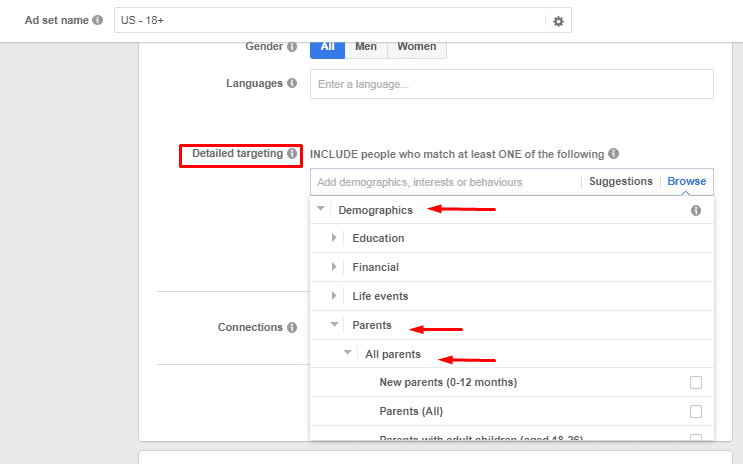Pregnant women may be interested in your company’s Facebook ad campaign if you are selling baby cribs. If you want to target women who are “Parents (Newborns),” you can first enter the demographic you want to target and then specify based on hobbies or brands.
Women interested in childbirth publications, Lamaze classes, or “What to Expect When You’re Expecting” can be targeted on Facebook. You might also target ladies who are interested in or purchase pregnancy clothing or companies.
For instance, since a crib can be used for future children, you may wish to target first-time mothers. It is possible to achieve this by omitting parents of children older than a baby or searching for products that only first-time mums utilize. And if you have a brand that sells products that helps pregnant moms and are interested to know how to target pregnant moms on Facebook, keep on reading.
How to Target Pregnant Moms on Facebook
Before this time, women in the United States were more likely to give birth in their early twenties than in their late thirties or forties. As a result, you’re looking at a large group of millennials and social media addicts. As with younger parents, both groups turn to search engines for answers to their most pressing concerns. You may have a general concept of who you’re trying to reach with sponsored advertising, but you’ll need to dig deeper to find out what is important to pregnant women.
Research on Pregnant Moms
Find pages, periodicals, and websites that pregnant women are likely to visit. To avoid general topics like “Babies R Us” or “16 and Pregnant,” you should focus on specifics like “What to Expect When You’re Expecting.” It’s critical to spend a lot of time doing this research because it will be the most crucial phase in the process, so don’t rush this. Then, focus on those pages. Then exclude all “New Moms – Parents” from the list. Pregnant first-time moms will be a good population to target, but those who have children and are pregnant will be left out.
New Parents Benefit from Educational Content
Using educational content to reach your target, mom-to-be may also be a viable option. You can target your audience with content marketing, and a blog geared for pregnant women and new moms has an almost built-in readership. Video content may appeal to younger, hipper, smartphone-wielding mothers because it may be accessed on various devices.
Keep Your Audience’s Priorities as the Focus
For example, who are you trying to contact, and what is their key concern? Millennial parents are becoming more common. Many brands must learn how to reach millennials to market to parents effectively. The following are some of the essential things for advertisers to know about millennials:
- tech-savvy
- related in a big way
- a person who craves immediate satisfaction
- authenticity is important to you
- collaborative
Parents’ hectic schedules only serve to accentuate these traits. As a result, they are eager to use technology to solve their problems and purchase things quickly. It would help ensure that the ad experience you provide parents with is as flawless as possible. They will not waste their time on poorly designed mobile sites or checkouts that take too long for modern parents.
A positive user experience should be the foundation for any paid advertising. Getting this properly helps you focus on fixing your target audience’s pain points rather than focusing on your own business. When it comes to parenting, there are three broad categories of needs:
- reducing elapsed time
- reducing expenses
- accomplishing a task more efficiently
If your website and products can assist parents in doing this, you may discover success with your paid marketing.
Ensure the Quality of Your Products
Your items or services must fit into the narrative of pregnant women or parents who are highly protective of their children.
It’s a difficult decision to make when you’re shopping for yourself. This is exacerbated when expectant mothers or parents buy items for their children. They need to know that the goods are safe, beneficial for their children, and long-lasting. Pregnant women and parents will not find your products enticing if they don’t demonstrate this.
By offering a guarantee, you may assist parents to feel more confident in your items. Your customers should be able to rely on your promises if you are satisfied with the quality of your products or services. If parents are willing to allow your brand into their children’s lives, they must have faith in your products.
Show Testimonials and Reviews
Many parents are now Millennials, which means they have a high degree of technological literacy and a strong sense of social responsibility. This means that if you want to make sales, you need to build a brand that people can believe in. In this context, social proof is a critical factor to consider.
Online review statistics are impressive:
- Before making a purchase, 93% of customers check out online customer reviews first
- Online reviews are trusted by 91% of people between 18 and 34, just as much as personal recommendations
- If a firm has a lot of positive ratings, customers are more likely to spend 31% more money there than they would otherwise
Having a system to ensure that your acquired reviews would be beneficial because they play a significant role in modern consumer decisions. To use social proof effectively, you need to know what other people say about your product and services.
Products that promise a lot but don’t deliver are every day in the parenting market. A solid recommendation from a fellow parent can go a long way in persuading parents to avoid such products.
Provide Free Parenting Tutorial
Children don’t come with a guidebook, and even if they did, it would be tough to follow it. According to 59% of mothers and fathers who have used social media in the last 30 days, they have found valuable knowledge about parenting. This information may be just what your company needs to provide.
Pay-per-click advertising can be used to reach pregnant women and new parents in general. If you’ve got some knowledge, you can use it. You can utilize your experience to describe the issue and give suggestions rather than just a quick fix.
Target Your Competitors’ Fans Using Audience Insights
With the help of Facebook Audience Insights, you may learn more about your Facebook audience. Use this information to identify new clients and followers. A favorite Audience Insight method is to use it to identify who you’re competing with on Facebook and then target their fans.
Use Multiple Ads To Target Pregnant Moms
It’s a good thing that you can test different ad creatives on Facebook through A/B testing, which is so helpful for marketers. You can use relevant material to target parents if you can narrow down your target audience and figure out who’s most likely to buy your stuff.
There are many differences between being a first-time parent and a second-time mom. First-time mothers shop for products differently than second-time mothers, and they look for different things. You can target specific demographics by using Google Ads, Facebook, Instagram, and other channels. Work on your buyer personas to get the most out of this opportunity.
Reach Pregnant Moms or Parents When They’re Searching
It’s no secret that pregnant women and parents are extremely busy. They’re often juggling the responsibilities of raising a child with the demands of a full-time job and other responsibilities that come with life. Late-night product searches are common among parents because of their work and daily schedules.
Having a better understanding of when parents use the internet might help you better target them and make your ads more successful. To discover when your customers are visiting and making purchases, use Google Analytics. Asking parents about their shopping habits via surveys is an excellent next step. You may learn a lot about parents’ buying habits by asking them a few simple questions.
Think Like A Parent
Identifying the type of parent you’re aiming to reach is critical to determining the most important interests, brands, and themes to target. What drives a parent to purchase this product or from a particular brand? If you don’t know what your audience cares about, then you can’t use Facebook’s targeting options to reach them.
Conclusion
Because pregnant women are diverse, it might be challenging to target them with paid advertisements. However, the desire to provide the best for their children is something all pregnant mothers have in common. As a marketer, you need to know how your business supports expectant mothers.
If you can guarantee the safety of your products and assist customers by providing them with valuable information, you can develop strong business partnerships. The more you know about your audience, the easier this should be. We hope you have learned something from this guide about how to target pregnant moms on Facebook.


